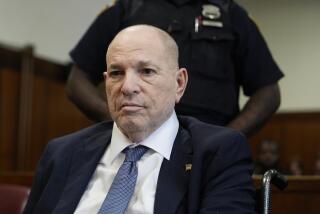More Charges Filed Against Keating, Others : Thrifts: The expanded 46-count indictment against the former Lincoln Savings owner and three ex-officers comes after 22 counts were dismissed.
- Share via
Los Angeles County prosecutors Monday filed an amended and expanded 46-count indictment alleging securities fraud against former Lincoln Savings & Loan owner Charles H. Keating Jr. and three others.
The new charges were submitted to Los Angeles County Superior Court Judge Lance A. Ito 10 days after he set aside 22 counts in the original 42-count grand jury indictment. He said the 22 counts either did not state a criminal offense or were vague.
Deputy Los Angeles County Dist. Atty. William Hodgman, who had promised to present a “bulletproof” amended indictment, said Monday that the latest version should make it “easier to get a conviction” because a trial court jury would better understand the complicated case.
Hodgman said the addition of four new counts won’t expose the defendants to a harsher penalty because a conviction on only six counts carries a maximum 10-year prison term. But the new charges increase the chances of getting the convictions, he said.
Keating and the co-defendants--Judy J. Wischer, Ray C. Fidel and Robin S. Symes--have pleaded innocent to the original 42 counts. Attorneys for the four said they would seek dismissal of the amended indictment. They argue that only the grand jury, not prosecutors, can alter the indictment.
“This is an invasion of the grand jury’s province,” said Donald Smaltz of Los Angeles, attorney for Symes, a former Lincoln president.
Keating is the former chairman of American Continental Corp. in Phoenix, which owned Irvine-based Lincoln. Wischer is former president of American Continental, and Fidel succeeded Symes as Lincoln president.
In a separate action Monday, an administrative law judge in Washington denied Keating’s request to halt an administrative hearing on a $40.9-million restitution claim that regulators have filed against him. Keating wanted the hearing delayed until other civil and criminal cases are concluded. The judge also denied Keating’s request to change the location of the hearing from Los Angeles to Phoenix.
Administrative Law Judge Paul J. Clerman said the hearing will start within four months, adding that any “unwarranted delay . . . could only increase the public’s concerns.” Regulators are seeking restitution from Keating and others for three Lincoln deals.
The grand jury indictment accuses Keating and the three co-defendants of fraud in connection with the sale of more than $200 million in American Continental bonds to 17,000 investors--mainly elderly Lincoln depositors--at 29 Lincoln branches in Southern California. Many investors said they were misled into believing that the bonds were insured or safe.
The bonds have become worthless since American Continental filed for bankruptcy protection in April, 1989, and regulators seized Lincoln the following day. Lincoln’s collapse is expected to cost taxpayers more than $2 billion.
In an indictment unsealed Sept. 18, Keating and his co-defendants were charged with securities fraud in the sale of the bonds. But defense attorneys argued at a Nov. 9 hearing that the charges were too vague and should be dismissed.
Ito ruled that 20 of the 22 counts he set aside did not state an offense. They allege that the defendants sold bonds in ways that exceeded the authority given them by the state Department of Corporations, which approved the sales. The law makes it a violation only if sales are conducted without authority.
Ito ruled that two other charges--ones that accuse the defendants of lying to the Department of Corporations and failing to clear advertising with the agency--did not give Keating and the others a specific idea of what they did wrong.
In amending 20 of the 22 counts that were set aside, the prosecution still alleges that Keating and the others sold securities without authority, but it left out the passage alleging that they exceeded the authority they had.
Smaltz contends that since American Continental had authority to sell bonds, the defendants didn’t violate the state law listed in the indictment.
More to Read
Sign up for Essential California
The most important California stories and recommendations in your inbox every morning.
You may occasionally receive promotional content from the Los Angeles Times.













